Gender and sexuality protests
In our collections
The long and ongoing fight for rights and equality for women and LGBTQIA communities is increasingly well-documented in our collections. While the nature of gender and sexuality protests often see great diversity, this guide focuses on material held by the Library including women’s suffrage, equal pay for women, women's march for justice, the Mardi Gras protest, decriminalisation of Homosexuality and the Say Yes to Marriage Equality movement.
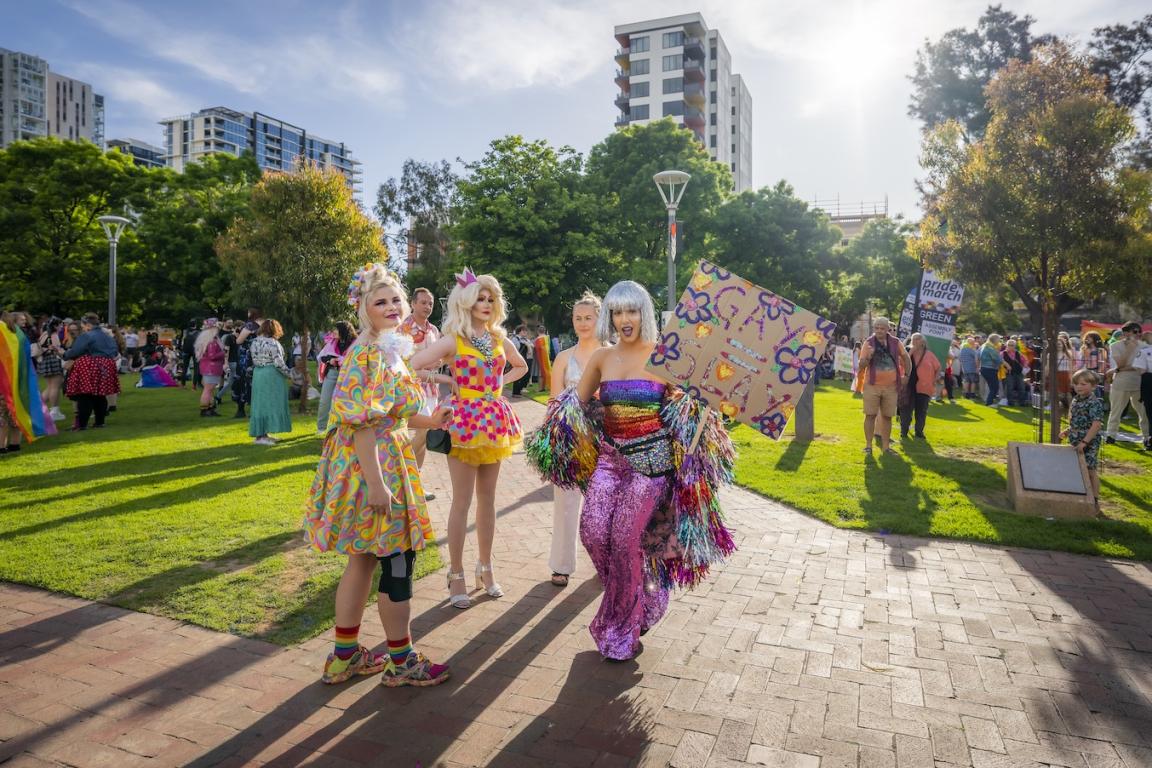
Jiayuan Liang, The LGBTIQA+ communities assemble at Light Square before at the Pride March, Adelaide, 5 November, 2022, nla.gov.au/nla.obj-3144558245
Jiayuan Liang, The LGBTIQA+ communities assemble at Light Square before at the Pride March, Adelaide, 5 November, 2022, nla.gov.au/nla.obj-3144558245
Just getting started?
For general sources and search tips to navigate our collections on protest, participation and dissent in Australia, go to our protest and dissent research guide.
Womens suffrage
In 1894, the women of South Australia won the right to vote in South Australian elections (which was still a colonial state at the time).
The right to vote, which became known as the enfranchisement of women, would be given to all non-Indigenous, non-migrant women of Australia in 1902.
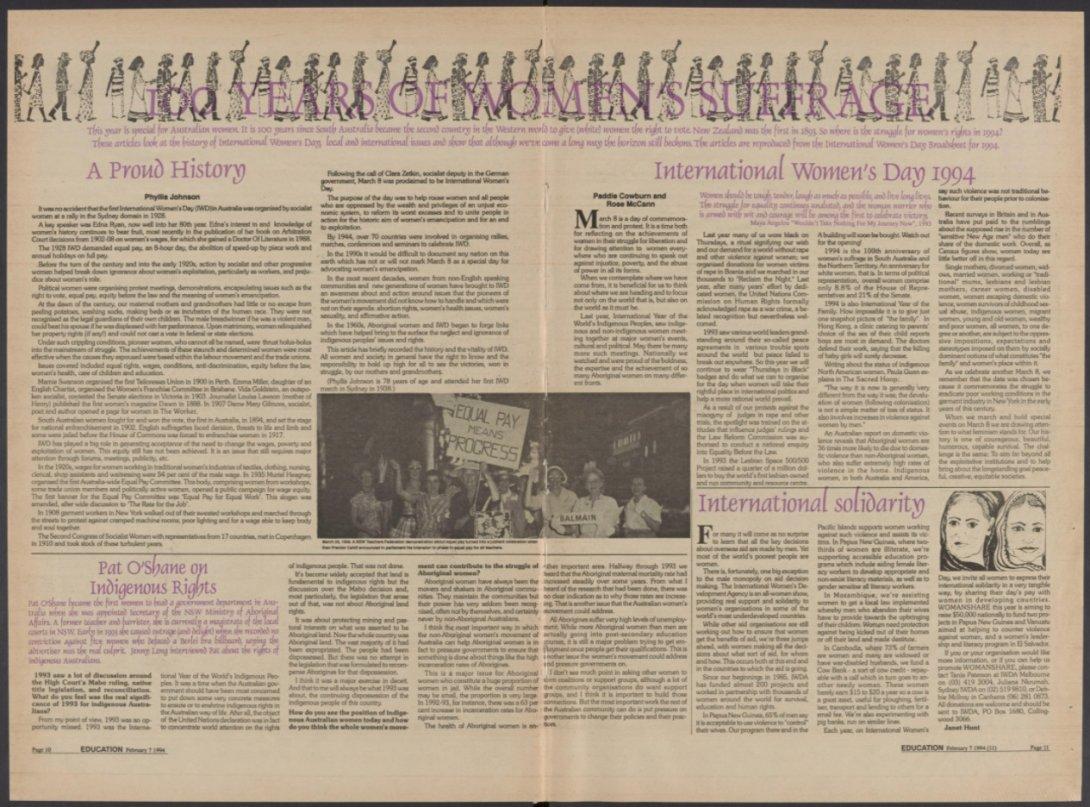
Education: journal of the N.S.W. Public School Teachers Federation, Vol. 75 No. 01, p. 10, 7 February 1994, nla.gov/nla.obj-525471579
Education: journal of the N.S.W. Public School Teachers Federation, Vol. 75 No. 01, p. 10, 7 February 1994, nla.gov/nla.obj-525471579
Key sources
The Library has a large collection of contemporary print material from the women’s suffrage movement, including newsletters, journals and a strong collection of manuscript material.
- The papers and objects of Bessie Rischbieth: Broaches, pins, and documents relating to the women's suffrage movement in Australia. Her collection is one of the largest on this topic at the National Library.
- Papers of Ruby Rich
- Papers of Jessica Street
- Records of the Australian Federation of Women Voters
Search tips
Use keywords to search by title, author or subject in the catalogue or Trove.
Try these search terms:
- Women’s Suffrage
- Women's Votes Australia
- Enfranchisement Women Australia
- Bessie Rischbieth
- Jessica Street
- Ruby Rich
Where else to look
For another great resource, go to the State Library of South Australia’s Women’s Suffrage research guide.
Equal pay for women protest
Following the Second World War, the fight for equal rights for women in the workplace quickly took centre stage. However, it wasn’t until 1969 that women were first rewarded with equal pay - but only for certain roles.
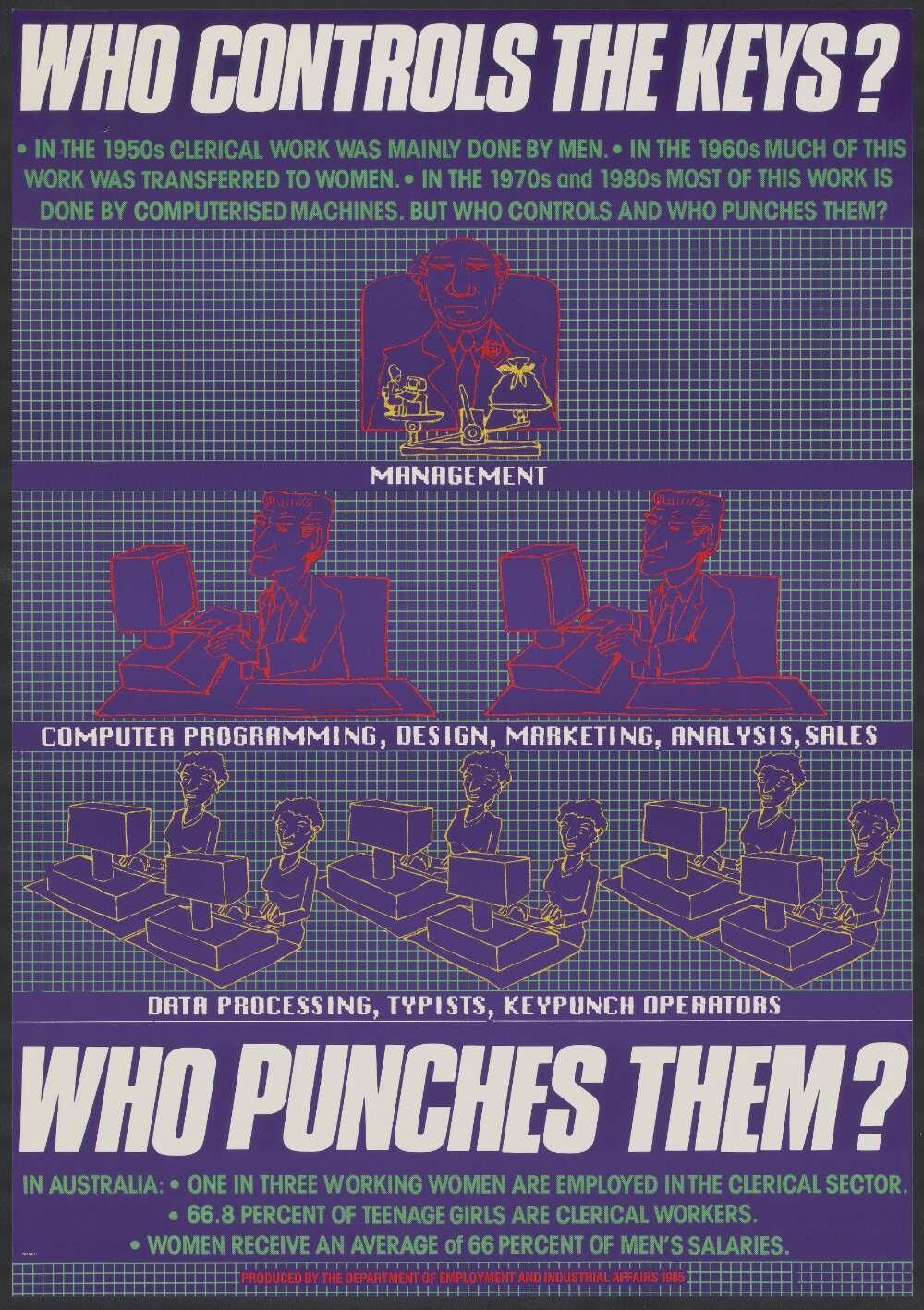
Department of Employment and Industrial Affairs, Who controls the keys? who punches them? nla.gov.au/nla.obj-133716706
Department of Employment and Industrial Affairs, Who controls the keys? who punches them? nla.gov.au/nla.obj-133716706
Key sources
Our collections substantially document this part of Australia’s history, including some interesting and unique collections and material.
- The Equal pay for women ephemera material in the Riley Collection: a range of brochures, pamphlets, flyers and other everyday material produced for the union-organised protests from the fifties and sixties.
- Audio recording of Jean Arnot interviewed by Amy McGrath: Jean was an activist during the Equal Pay for Equal Work protest, who applied her knowledge and activism to the Library space in New South Wales.
Search tips
The language used to describe the issue has varied greatly over the years. That can make it difficult to search for material using only keywords.
Try these subject headings in the catalogue:
Mardi Gras Protest 1978
The first Sydney Mardi Gras was held in 1978, to commemorate the Stonewall riots in New York in 1969 and support the lesbian and gay community in San Francisco (who were at the time fighting the Brigg Initiative). During the 1978 Sydney Mardi Gras, participants were met with strong opposition and violence from police, with many being jailed for their participation.
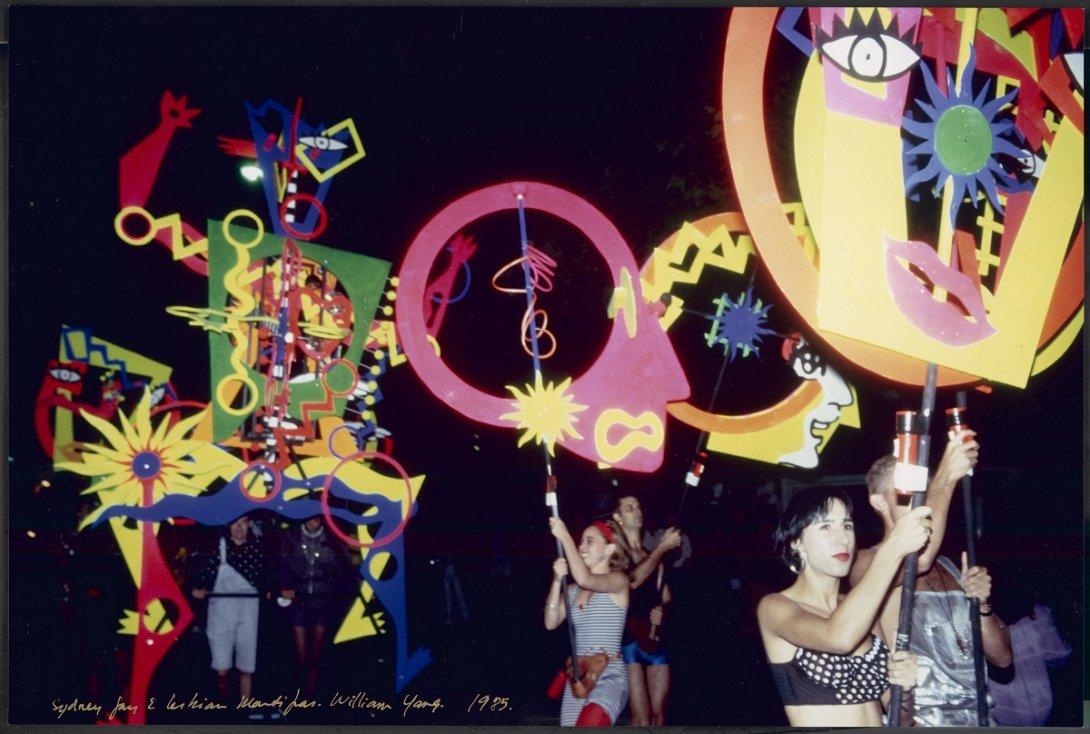
William Yang, [Abstract colour designs on parade float], Sydney Gay & Lesbian Mardi Gras, 1985, nla.obj-136925205
William Yang, [Abstract colour designs on parade float], Sydney Gay & Lesbian Mardi Gras, 1985, nla.obj-136925205
Key sources
We hold unique collection material about the 1978 Mardi Gras protest, with material that cannot be found anywhere else.
- Sydney Gay and Lesbian Mardi Gras oral history project: audio recordings of participants of the Mardi Gras parade in 1978
Search tips
There is also a large collection of digitised newspapers, magazines and journals available. Use keywords to search by title, author or subject in the catalogue or Trove.
Try these:
- Mardi Gras 1978
- First Sydney Mardi Gras 1978
- Sydney Gay and Lesbian Mardi Gras 1978
- 78’ers Mardi Gras
Content note
Some material in the catalogue may include content and language that is upsetting or triggering. The historical nature of this material means it may include terms and language that may be seen as offensive. Records reflect the language and attitudes of the historical period in which they were created and do not reflect the views of the National Library.
Decriminalisation of homosexuality
The 1970s and early 1980s were a time of powerful political protest.
The decriminalisation of homosexuality happened over a period of 22 years, with South Australia becoming the first state to decriminalise homosexuality in 1975. The rest of Australia’s states and territories followed over the years, with Tasmania decriminalising homosexuality in 1997.
Key sources
We hold unique collection material on the decriminalisation of homosexuality, particularly in our oral history and manuscripts collections.
- The LGBTQIA pioneers oral history project a suite of interviews with activists, pioneers and experts who were at the coalface of the movement, including:
- The Australian response to AIDS oral history project: discussion relating to the decriminalisation of homosexuality as part of Australia’s response to AIDS, along with other social and political issues at the time.
- Papers of John Trigg, approximately 1957-2015: correspondence and unpublished writings recording John Trigg's experience of growing up in the farming region of South Australia, his travels and religious upbringing, his sexuality and experience as a gay rights activist, and living with HIV after his diagnosis in 1985.
Search tips
Use keywords to search by title, author or subject in the catalogue or Trove.
Try these:
- Discrimination and homosexuality
- Decriminalisation of homosexuality
- Gay liberation or Gay liberation movement
You can also use these subject headings to find resources:
- Homosexuality -- Law and legislation -- Australia
- Gay liberation movement -- Australia
- Gays -- Legal status, laws, etc. -- Australia
- Gay rights -- Australia
Subject headings that are unique to Australia may have variations or state-based equivalents, such as:
- Gay liberation movement -- Australia
- Gay liberation movement -- Australia -- History
- Gay liberation movement -- Australia -- History -- 20th century
- Gay liberation movement -- New South Wales
It can be helpful to use the 'Subject' limit when you are looking at search results to identify similar subject headings.
Say yes to marriage equality protest
In 2017, the Australia Government received a 61.6% ‘Yes’ vote to the voluntary postal vote for Marriage Equality. This result came after many weeks of protest from the ‘Say Yes’ campaigners.
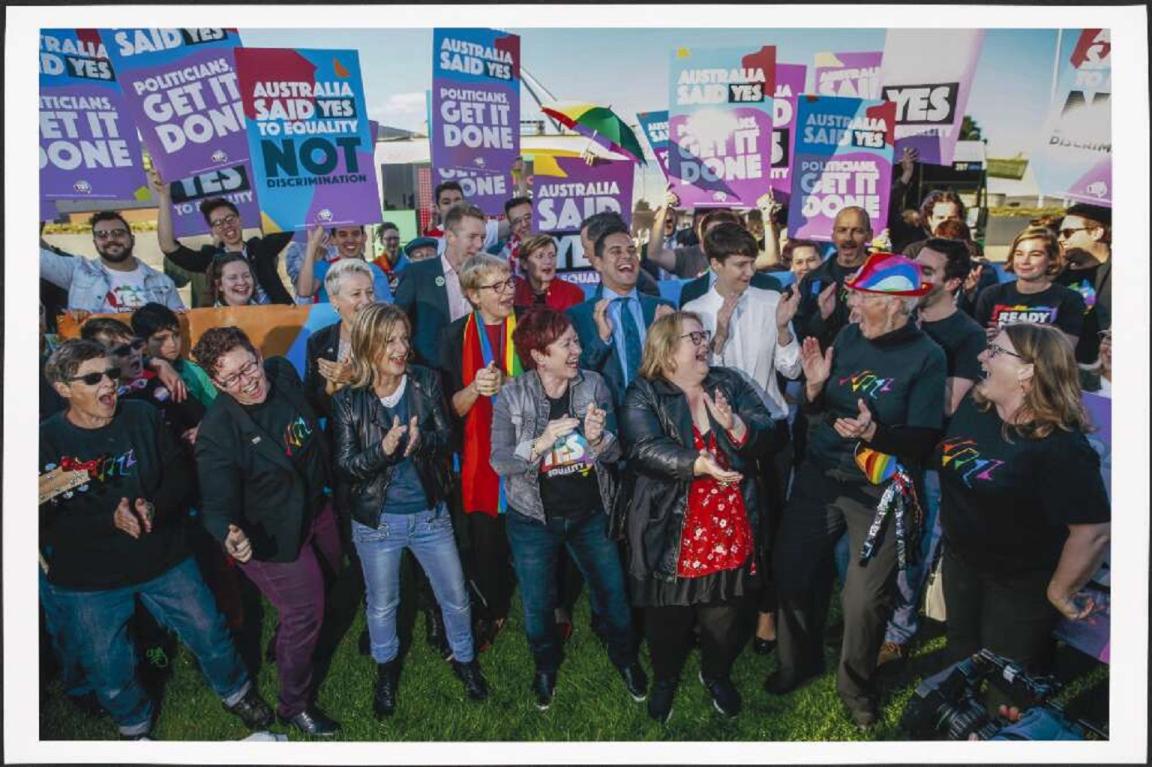
Sean Davey, Magda Szubanski, surrounded by a crowd of people, celebrating the passing of the Australian marriage equality bill on the lawn of Parliament House, Canberra, 7 December 2017, nla.gov.au/nla.obj-735215730
Sean Davey, Magda Szubanski, surrounded by a crowd of people, celebrating the passing of the Australian marriage equality bill on the lawn of Parliament House, Canberra, 7 December 2017, nla.gov.au/nla.obj-735215730
Key sources
We hold a large collection of material from the marriage equality movement.
- ‘Yes: to Equality’ website on the Australian Web Archive: provides context to the lead up to the campaign and events which took place throughout.
- Marriage Equality oral history project: contains 25 interviews with Australians in relation to marriage equality.
- Ephemera material from the Australian Marriage Law Postal Survey: badges, brochures, stickers, t-shirts, small objects and miscellaneous material like wedding invitations from both the 'Say Yes' and 'Say No' campaigns.
Search tips
Use keywords to search by title, author or subject in the catalogue or Trove.
Try these search terms:
- Say Yes to marriage equality
- Say Yes marriage equality campaign Australia
- Voluntary Postal Vote 2017
- Australian Marriage Law Postal Survey
March for justice against domestic violence
The March4Justice rally saw thousands of people across Australia protest the abuse and sexual violence faced by women. These rallies were held in major cities across Australia and has become one of the most well-known protests of 2021.
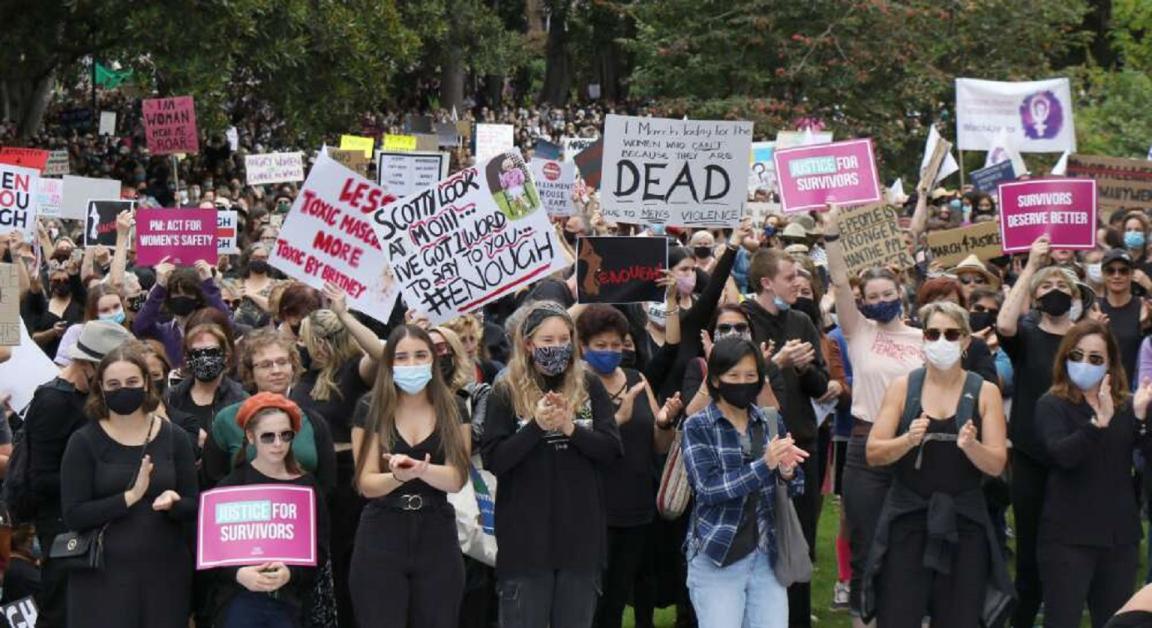
Leigh Henningham, Demonstrators holding placards at the Women's March4Justice rally, Treasury Gardens, Melbourne, 15 March 2021, nla.gov.au/nla.obj-2937256575
Leigh Henningham, Demonstrators holding placards at the Women's March4Justice rally, Treasury Gardens, Melbourne, 15 March 2021, nla.gov.au/nla.obj-2937256575
Key sources
We have acquired a large collection of photos from this recent protest, with works from photographers noted for their documentation of social issues and protest in Australia.
Search tips
Use keywords to search by title, author or subject in the catalogue or Trove.
Try these search terms:
- #March4Justice
- Claire Williams March4Justice
- Leigh Henningham March4Justice
Get help with your research
Our specialist staff can help you with your research, to locate resources and to use our microform and scanning equipment, but they cannot undertake extensive or ongoing genealogical, historical or other research on your behalf.
Find out more in our Information and Research Policy.